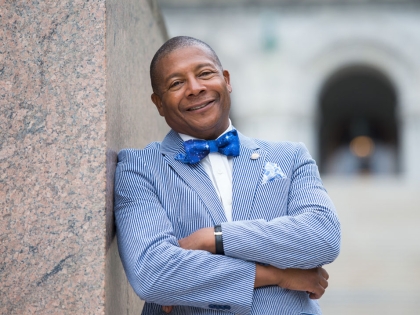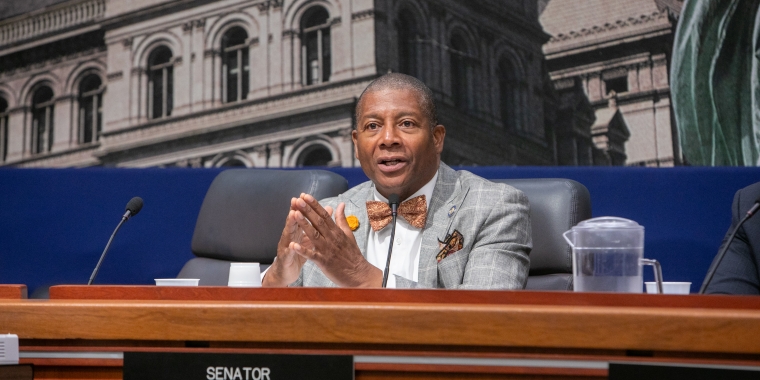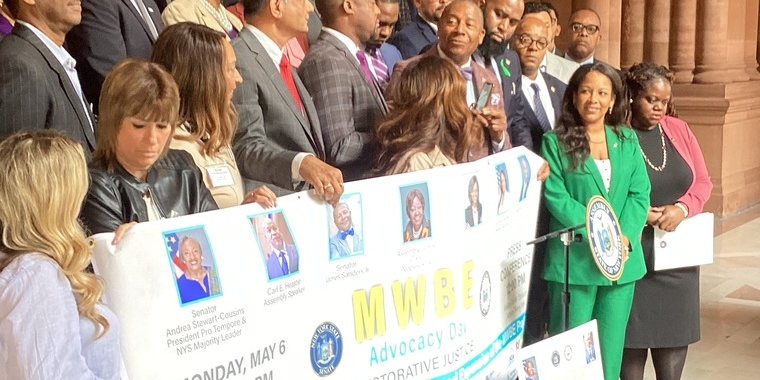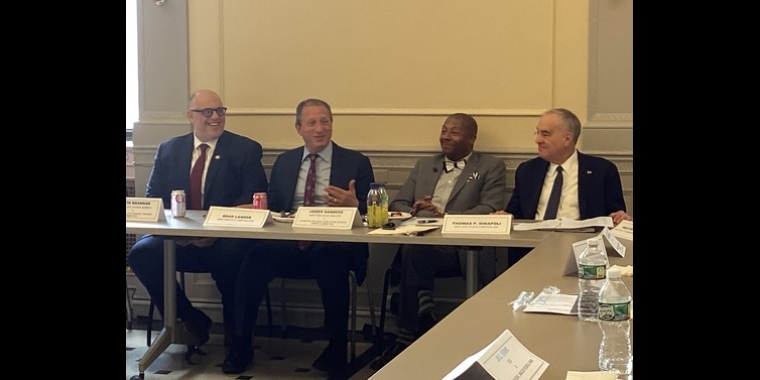
Senator Sanders Holds Public Hearing Revealing Disparities in New York’s Mortgage Banking and Credit Industry
Olalekan Omodunbi
May 7, 2024
-
ISSUE:
- Public Banking
- REDLINING AND PREDATORY PRACTICES
- Racial and Ethnic Discrimination
- equity
- Economic inequality

Albany, NY – May 7, 2024 – The New York State Senate Banks Committee under the leadership of Senator James Sanders Jr. today held a landmark hearing exposing the persistent barriers that people of color, women, and low-income New Yorkers face when seeking fair mortgage and credit access. The hearing, "Exploring Unequal Access to Loans in New York's Mortgage Banking and Credit Industry," highlighted stark findings from recent investigations.
In October 2023, Attorney General Letitia James released a report revealing deeply troubling racial disparities in homeownership, a key driver of wealth building. A CNN analysis (December 2023) further demonstrated these inequalities, with banks approving significantly less mortgage applications for Black borrowers than white borrowers. According to the analysis, while Navy Federal Credit Union approved over 75% of white borrowers who applied for conventional home purchase mortgages in 2022, the approval rate for Black borrowers was less than 50%.
Senator Sanders kicked off the hearing with a poignant introduction, drawing attention to a pivotal report unveiled by the office of the Attorney General. The opening remarks set the tone for a session poised to delve into critical matters of public concern.
"These reports reveal a disturbing reality that demands immediate action," said Senator James Sanders Jr., Chair of the Senate Banks Committee. "This hearing is a critical step in identifying the root causes of this systemic bias and developing solutions that ensure equal opportunity for all New Yorkers seeking to attain the American dream of homeownership."
During the hearing, Max Dubin, Esq., Special Counsel to the Superintendent of the New York State Department of Financial Services, spoke on promoting equity within lending practices. In response to identified discrepancies, DFS has taken steps, including the publication of its inaugural annual report, signaling a commitment to transparency and accountability.
Sandra Park, Chief of the Civil Rights Bureau, another witness shared that the geographic distribution of lenders in Rochester underscores a stark reality: they are predominantly situated in white neighborhoods. This spatial concentration exacerbates existing disparities, particularly pronounced in cities like Rochester and Buffalo, where non-white New Yorkers face disproportionate barriers to accessing financial services. She further shared recommendations to address these inequities which include subsidizing down payments for homebuyers, thereby facilitating homeownership among marginalized communities. Enacting the New York Public Banking Act can democratize financial access and empower underserved populations. Additionally, bolstering enforcement capacity through increased funding ensures that discriminatory practices are swiftly identified and rectified. Providing basic banking services in underserved areas is crucial for fostering financial inclusion. Moreover, allocating permanent funding to sustain these initiatives is essential for long-term progress towards economic equity.
New York's push towards public banking marks a significant step in reshaping the financial landscape, prioritizing community needs and equitable access to financial services. Spearheading this transformative initiative is Senator Sanders, who has introduced a groundbreaking bill aimed at establishing the New York Public Banking Act. This legislation, championed by Sanders, seeks to create a robust framework for public banking institutions across the state, offering an alternative to traditional banking models that often prioritize profit over people. By sponsoring this bill, Senator Sanders underscores his commitment to fostering economic justice and empowerment for all New Yorkers, particularly underserved communities disproportionately affected by the shortcomings of the current financial system.
Senator Sanders shed light on the systemic inequities faced by Black and brown communities, emphasizing how they often receive inferior products while paying higher prices. With such disparities persisting, Senator Sanders urged the Department of Financial Services (DFS) to play a pivotal role in addressing these issues, particularly by weighing in on the imperative matter of reparations. Highlighting the importance of transparency and accountability, Senator Sanders also emphasized the necessity of understanding DFS's stance on public banking. As communities grapple with financial injustices, clarity from DFS on these crucial matters is paramount for progress towards a more equitable future.
“I’d like to thank Sen. Sanders and the other members of the Banks Committee for including New York credit unions in the conversation surrounding inequalities in the mortgage banking industry,” said New York Credit Union Association President & CEO William J. Mellin. “New York credit unions are working to alleviate disparities present in mortgage banking and are actively looking for solutions and developing strategies to bring more New Yorkers into mainstream financial services by providing fair products to improve their lives. Credit unions meet New Yorkers where they are and believe that regardless of location or socioeconomic status, everyone should have access to pro-consumer financial services, and to homeownership. Credit unions are dedicated to their mission of ‘People Helping People’ and will continue to do their part to ensure financial inclusion for all New Yorkers.”
“We are grateful to Sen. Sanders and the legislature for the chance to testify on the subject of disparities in the mortgage markets,” said Michael Corcoran, the Deputy Director of the Homeowner and Consumer Rights Project at Legal Services NYC’s borough office in Queens. “The low- and moderate-income homeowners whom we serve are primarily people of color, and often elderly. Over many generations, major banks and corporations excluded them from homeownership opportunities, and then targeted them for predatory lending and equity stripping schemes. These New Yorkers need attorneys and housing counselors to confront deed theft scams, zombie second mortgages and other threats to their housing stability and to the intergenerational wealth that their homes represent. Fully and permanently funding the existing statewide network of homeowner advocates, the Homeowner Protection Program, is the single best tool available to stop displacement and the loss of home equity in vulnerable communities."
John J. Witkowski, President & CEO, Independent Bankers of New York State said, " IBANYS is honored to participate in Senator Sanders' hearing on "inequities in the mortgage sector". We are working together to propose a solution.
Christie Peale, Executive Director/CEO of the Center for NYC Neighborhoods said, “I applaud Sen. James Sanders and the New York Senate Committee on Banking for holding this important hearing to address inequities in the mortgage banking industry, and highlighting the need to make bold changes. The Center for NYC Neighborhoods, through our advocacy and direct services, has been fighting to correct the racial inequities of the past to ensure Black and Brown New Yorkers have equal access to homeownership opportunities. Buying a home and getting approved for a mortgage are pivotal moments that can change a family’s trajectory, and it’s inconceivable that the process today is still marred by deep systemic, racial disparities. For over a decade, the Center has provided services to help New Yorkers at all stages of their homeownership journey: foreclosure prevention services, protection against scams, a community lending arm to make loans to homeowners in need, and more. While we remain engaged in building the strongest and most vibrant community ecosystem possible, we know additional resources that support equitable financial institutions and stronger regulation will help to ensure that all New Yorkers have an equitable pathway to achieving and maintaining homeownership.”
Witness who testified at the hearing included;
- Max Dublin, Esq, Special Counsel to the Superintendent, New York State Department of Financial Services
- Sandra Park, Chief of the Civil Rights Bureau, Office of Attorney General Leticia James State of New York
- Christopher D’ Angelo, Chief Deputy Attorney General for Economic Justice, Office of Attorney General Leticia James
- John J. Witkowski, President & CEO, Independent Bankers of New York State
- William J. Mellin, President & CEO, New York Credit Union Association
- Jeff Pinard, President, New York Mortgage Bankers Association
- Christie Peale, CEO/Executive Director, Center for NYC Neighborhoods
- Latoya Allen, Deputy Executive Director, Home HeadQuarters, Inc
- Michael Corcoran, Deputy Director of the Homeowner and Consumer Rights, Queens Legal Services
As the hearing drew to a close, Sanders delivered a resolute message, reaffirming his unwavering dedication to safeguarding the interests of the public against malpractice within the financial sector. Expressing solidarity with those who may feel marginalized or vulnerable, Sanders emphasized his steadfast stance in advocating for equitable treatment and protection for all constituents. His pledge to uphold the integrity of New York's financial landscape echoed his vision for an inclusive and accessible environment, ensuring that the state serves the needs of every individual, regardless of their circumstances. Sanders' closing remarks encapsulated a call to action for a fair and just financial system, underscoring his commitment to championing the rights of the people and fostering a New York that truly caters to the needs of everybody.
###
related legislation
Share this Article or Press Release
Newsroom
Go to Newsroom


